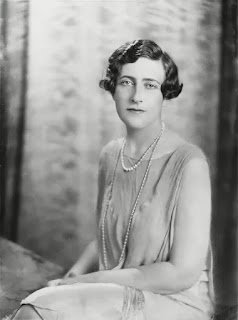Agatha Christie: A Very Elusive Woman, by Lucy Worsley
This is a biography, not a dissection of the books, which only enter the picture as background to the life. Agatha Christie used her experience, observations and opinions in her novels, and one day someone will tie up all these threads.
It is very readable. Lucy Worsley is chatty, informative and insightful, and doesn't try to be elaborate or flowery. Thankfully, she doesn't embark on long, tangled sentences that require several readings (other writers please take note). She has trawled letters and old newspaper reports to come up with a sympathetic account of the mystery writer's life.
Worsley has convinced me that Christie's loss of memory during her well-known disappearance was genuine. She was already thinking of taking a holiday in Yorkshire, and had taken out £60 in cash, which she had in her handbag. If she discovered that evening that her errant husband Archie was not "staying with friends" but with his new girlfriend, it might have pushed her over the edge. Unaware of who she was, she proceeded to Yorkshire, stayed in a smart hotel and bought a lot of fashionable clothes – she even danced the Charleston in the ballroom.
When the police brought Archie (a murder suspect) to see if he recognised the woman who'd been pointed out by hotel staff, she introduced him to friends as her brother. He took Agatha to her sister's, where her memory gradually returned, though she failed to recognise her daughter. I still wonder, though, whether the story The Affair at the Bungalow was a backhanded reference to these events.
Good though this book is, I can't help picking up on a few inaccuracies. Worsley can't resist using the cliché "overstuffed" to describe Christie's childhood home, Ashfield in Torquay. In an old photograph, a relative "sports tiny mutton-chop sleeves". The puffed sleeves were known as "leg o' mutton". A postwar book, They Do It With Mirrors, features "Stoneygates, housing an institution for troubled children". It is an institution for young criminals. It's atropine, not "atrophine", and unrepentant not "unrepentent". Tommy and Tuppence are not Bright Young Things. The Christies' big house in Sunningdale was called "Styles", not "The Styles". Worsley refers to "the macabre Mr Pye with his ‘womanish mouth’, his ‘mincing walk’ and his antique shop in Murder Is Easy". Mr Pye, also rather fey, features in The Moving Finger. The antique-shop owner is Mr Ellsworthy.
Did we call flicked-up spectacles "cat's-eye glasses"? It seems we do now. ("Cat-eye prescription glasses were designed to empower the women of the world," says a site selling frames. Gosh! Did it work?)
"Because people think of Agatha as a timeless writer, they’re sometimes surprised to find that the politics of her novels haven’t always aged." Later she writes: "The reason some of Christie’s statements cause such pain today, I think, is because people think of her writing as somehow timeless." Also: "Her writing has such ease and clarity it doesn’t immediately shout out about the particular year in which it was written." Christie's books are all grounded firmly in a time and a place, and take a beady-eyed note of passing fads and fashions, and even world events. Does Worsley mean that Christie didn't write in a style we think of as old-fashioned – like Conan Doyle, for example? Sleeping Murder, written during the War and stashed in a bank vault, really is deliberately timeless, and suffers as a result.
All writers these days have to address earlier attitudes to gender, race and class. People in the past are guilty of having servants, which meant they had a hierarchical view of society, or worse. "This can be seen in novels like Evil Under the Sun, where the staff of a hotel are freed from suspicion entirely on the basis of class."
As a young married woman, Christie had a cleaner, and the help of her husband's ex-batman. But running a house was far more labour-intensive in the days before freezers, hoovers and the rest, and one person could barely do it all.
Apparently Dorothy L. Sayers and Margery Allingham "loved toffs". Sayers made her detective a Lord because she noted that people liked reading about the aristocracy. Perhaps in response, Allingham hinted that her detective was a renegade member of the royal family.
Worsley claims that Christie, and her characters, are "repellently anti-Semitic". There's no need for that "repellently", we know anti-Semitism is repellent, and expect Worsley to agree. She picks out the most damning evidence: Herman Isaacstein in The Secret of Chimneys, Madame Alphrège in The Hollow, and the treatment of refugee Mitzi in A Murder Has Been Announced. (I need to review this mystery, one of Christie's best, and reclaim Mitzi from the other characters' negative judgements.)
I really do recommend this book, though!
More on Christie here, and links to the rest.

No comments:
Post a Comment